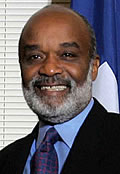how could we not have studied him
< Previous | Home | Next >
The following is a biographical text, published in 1854, about Toussaint Louverture from the book: God's Image in Ebony: Being a Series of Biographical Sketches, Facts, Anecdotes, etc., Demonstrative of the Mental Powers and Intellectual Capacities of the Negro Race, edited by H.G. Adams
CHAPTER II.--BIOGRAPHICAL SKETCHES.
TOUSSAINT L'OVERTURE.
WE need look no farther for a contradiction of the alleged inferiority of the Negro race, than the subject of this sketch.
Here was a man--a true "image of God cut in ebony"--black, and all black; with no drop of other than African blood flowing in his veins; but one generation removed from the wild and savage state of an unreclaimed son of the forest and the desert; a man, too, who passed the first fifty years of his life in a state of slavery, which, although of a mild form, admitted of but few means and opportunities of mental improvement; and yet, by the mere force of the moral and intellectual powers within him, he achieved a greatness, little, if at all inferior to that of any white-skinned warrior or legislator of his own, or any other age of the world's history.
If we were among those who would set up the military hero as the highest type of human excellence, we should probably find sufficient in the career of this Toussaint L'Overture to justify our largest meed of praise and admiration; he might indeed well be called the "Napoleon of the Blacks," only that his patriotism was purer, his aims more noble and unselfish, his heart far less hard and cruel, and his mind too benevolent and solicitous for the good of his fellow-men, to allow of the fall and appropriate application of such a title.
Did we admit that the magnanimous ruler, the framer and administrator of just and wholesome laws, the calmer of unruly passions, the reconciler of conflicting interests, and the reducer of chaotic elements into harmonious and symmetrical order, were entitled to the highest pinnacle of earthly glory and greatness, then might we also claim for this erewhile chief of a black-skinned community a lofty place in the estimation of the world.
But it is neither as the warrior nor to the legislator, great as he undoubtedly was in both these capacities, that we look upon Toussaint L'Overture with the greatest admiration.
Rather do we prefer to view him in his social and domestic relations--as the attached and devoted servant, the tender and affectionate husband and father, the faithful friend, the strict observer of his promises and engagements, "the man who never told a lie," and scorned to act meanly or disingenuously even to an enemy.
These are the traits in his character, we say, which it best pleases us to contemplate, although they are not those, perhaps, which have contributed most to exalt him in the eyes of the world at large--which have, by the blaze of his achievements, and the loud blast of his renown, been attracted to that beautiful island of St. Domingo, or Hayti, (the land of mountains,) as it was originally, and is now again usually called--that island which has furnished us with so striking an example of Negro capacity, both mental and physical, and shown that the black man is not a whit inferior to his fair-skinned brother, either in the qualities which win for him the esteem and affection of all true hearts, or in those which are generally allowed to constitute real greatness of character.
Francois E, January 7 2007, 3:51 PM
Start a NEW topic or,
Jump to
previous | Next Topic >
< Previous | Home | Next >
Messages in this topic
< Previous | Home | Next >

 Presidents Rene Preval, Raul Castro, Daniel Ortega, and Leonel Fernandez
Presidents Rene Preval, Raul Castro, Daniel Ortega, and Leonel Fernandez  Rene Preval and Leonel Fernandez
Rene Preval and Leonel Fernandez  Rene Preval and Fidel Castro
Rene Preval and Fidel Castro  President Rene Preval and Hillary Clinton
President Rene Preval and Hillary Clinton  Rene Preval and Jean-Louis Debre
Rene Preval and Jean-Louis Debre  Rene Preval and Josette Sheeran
Rene Preval and Josette Sheeran  President Rene Preval
President Rene Preval  Rene Preval and Hugo Chavez
Rene Preval and Hugo Chavez  Rene Preval and Peter MacKay
Rene Preval and Peter MacKay  Rene Preval and Condoleezza Rice
Rene Preval and Condoleezza Rice  President Fidel Castro Hosts Haiti President-elect Rene Preval
President Fidel Castro Hosts Haiti President-elect Rene Preval  Rene Preval Sworn In As Haiti's New President, Jeb Bush
Rene Preval Sworn In As Haiti's New President, Jeb Bush  Bringthepai Preval Kout Soulye
Bringthepai Preval Kout Soulye  Discour President Rene Preval Aux Gonaives 1er Janvier 2009
Discour President Rene Preval Aux Gonaives 1er Janvier 2009  The Bush Administration Gave Its Deaf Ear To Haiti S President Rene Preval
The Bush Administration Gave Its Deaf Ear To Haiti S President Rene Preval 

